Iranian people will soon overthrow Islamic Republic - US lawmaker
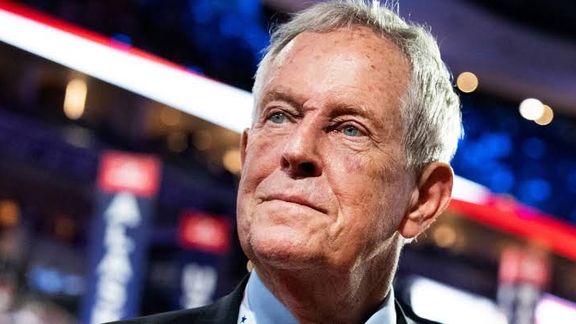

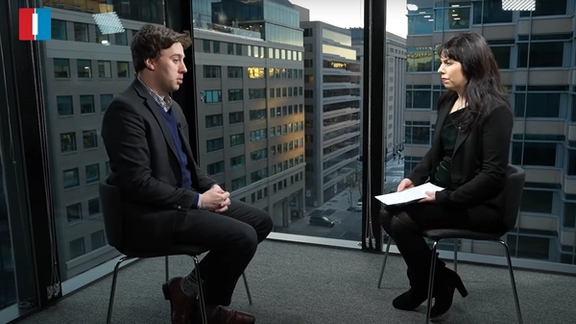
President Donald Trump's policy on Iran may depart from the maximum pressure campaign of sanctions which defined his first term, Alexander Farley of the Woodrow Wilson Center told Iran International.
Trump has excoriated his predecessor Joe Biden for allowing Iran to rake in more revenue from oil sales to boost armed allies in the region.
Newly appointed aides have pledged to revive a so-called maximum pressure campaign of sanctions on Iran to compel it to drop its disputed nuclear program.
But Trump's public break with two officials who helped mastermind the strategy may indicate a new tack on how to deal with Washington's Mideast arch-enemy.
"John Bolton, much like Brian Hook is someone who here in DC we associate very closely with the maximum pressure school of policy toward Iran," Farley said. "The fact that those two were removed must mean the President is somewhat unsatisfied with how things went in his last administration."
Trump dramatically deprived Bolton, his former national security advisor and former Iran envoy Brian Hook despite them being a target - like Trump himself - of alleged assassination plots by Tehran.
In the wake of Trump's first term, Farley continued, "Iran became more conservative, Iran became more embedded in the region in a lot of ways. That's changed recently, but perhaps that's what he's reflecting on."
"President Trump ... doesn't want to preclude maybe making a deal if he thinks it's in his interest and in the US interest. So I think, you know, he's kind of maybe giving up on theory a little bit and Maybe trying to take it in a new direction."
An advocate of hard line on friend and foe alike to advance his so-called America First policy, Trump has said Iran cannot be allowed to develop nuclear weapons but has also dismissed the idea of seeking regime change.
Speaking to reporters in the White House on Thursday, Trump said he hoped the United States would not have to support an Israeli strike on Iran to take out its nuclear sites and a deal would be preferable.
"I wouldn't say I foresee a deal, but I foresee some sort of effort to open up discussions," Farley added. "He might dangle some kind of opportunity to negotiate along with a very aggressive policy."
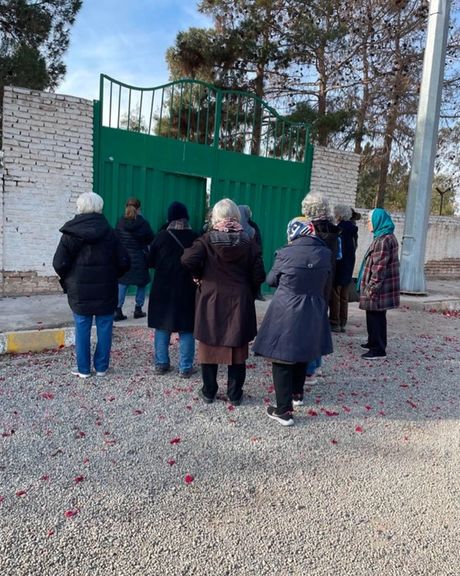
Families of Iranian political prisoners executed in the 1980s have been barred from entering Khavaran Cemetery in Tehran for more than 11 months, they said in an open letter to Iran’s President Masoud Pezeshkian.
The site, known for containing mass graves of thousands of political prisoners executed in the summer of 1988, has been closed to the families since early 2024, the families said.
“For 11 months, Khavaran’s gates have been closed to us,” the letter read. “Despite our numerous attempts to resolve this legally, we have been met with silence or insulting behavior by officials,” they said.
In the letter, the families accused authorities of obstructing their basic right to mourn. They detailed repeated appeals to various government bodies but said they have received no meaningful response.
They said their petitions have been referred between agencies, with intelligence officials refusing to address their concerns.
The families also condemned the burial of unrelated individuals at the cemetery, calling it disrespectful and a renewal of their grief. They demanded the removal of barriers to the cemetery, the reopening of its gates and the cessation of additional burials at the site.
A total of 93 families signed the letter, which also criticized the behavior of cemetery staff. They said the individual overseeing the site, identified as Masoud Momeni, has harassed families, limited their visitation times and demanded national ID cards to grant access to graves, further compounding their suffering.
The letter was also sent to senior officials, including the judiciary, interior ministry and Tehran's local authorities, as part of their ongoing fight for justice and accountability.
The Abdorrahman Boroumand Foundation, a US-based rights group, reported that on Friday, the families once again faced locked gates at the cemetery and protested the ban by scattering flowers at its entrance.
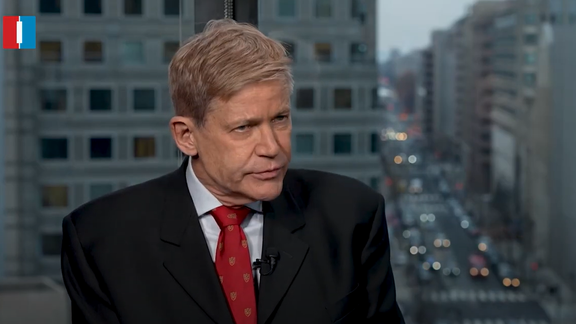
Reviving the so-called maximum pressure campaign on Iran will likely define US President Donald Trump’s strategy toward Washington's arch-foe in the Middle East from day one, Middle East policy expert Patrick Clawson told Iran International.
In an interview with Iran International’s Samira Gharaei, Patrick Clawson, Director for Research at the Washington Institute described the potential impact on Iran of a widely expected renewed hard line from Washington.
Clawson anticipates a return to the so-called maximum pressure approach from Trump's first term, primarily through intensified enforcement of existing sanctions. He acknowledged, however, that logistical challenges could delay new sanctions.
"The Trump Administration is likely to start thinking from day one about what additional steps to take but it may be a while before we see them actually able to implement those kinds of steps," Clawson said.
"The Trump administration will need to prioritize enforcement, especially given competing sanctions efforts against Russia and others."
The former president’s personal feelings towards Iran— stemming from an alleged assassination plot by Tehran—could influence his approach.
Trump will seek the restoration of United Nations sanctions on Iran which were lifted by the 2015 nuclear deal, newly sworn-in secretary of state Marco Rubio told congress this week.
The newly-minted head of state whose sanctions piled pressure on Iran's oil revenue in his first term and hit Tehran's spending on armed allies in the region, also ordered a deadly drone strike on a top Iranian commander, Qassem Soleimani.
Potential Iran-US talks
Despite the potential for increased pressure, Clawson raised the possibility of renewed talks, highlighting the former president's self-perception as a dealmaker.
"Trump has a long memory, and he takes personal slights seriously," he noted. "While he might entertain the idea of a deal, Iran’s leadership, particularly Khamenei, remains deeply skeptical."
Whether Tehran is willing to engage in new talks remains uncertain as Iranian officials and media remain sharply divided on relations with Washington with Trump back in the White House.
Clawson highlighted the recent setbacks for Iran's armed allies in the region, such as Hamas and Hezbollah, as a potential motivator for seeking a deal.
"Iran’s recent failures may create an opening for diplomacy," he suggested. "However, Khamenei’s uncompromising nature often leans toward retaliation rather than reconciliation."
Regarding Israel, Clawson acknowledged Prime Minister Benjamin Netanyahu's past caution on military action against Iran but also noted a shift in the Israeli military's posture. He suggested that recent Israeli military successes might embolden them.
"Israel, with its recent military successes, is more confident than ever in confronting Iranian threats."
While acknowledging the significant changes in the region, Clawson cautioned against premature pronouncements of a "new Middle East," pointing out the region's history of unexpected developments.
"The Middle East has a remarkable ability to throw up new problems, and I would anticipate that we're going to see new problems in the region, things we hadn't expected."
Iran's nuclear program and a post-Khamenei future
Clawson expressed concern about Iran's advancing nuclear program and the potential for a more aggressive stance after Khamenei's departure.
"Khamenei’s micromanagement has kept the system intact," he said, arguing that without him, there’s a real risk of power struggles that could lead to a hardline push for a nuclear weapon.
"I suspect that in the political maneuverings in Tehran that they're going to be some people who say, 'Let's go ahead and do that bomb.' I am concerned that in what's likely to be a rather unsettled situation after Khamenei passes from the scene."
The head of Iran’s Armed Forces Judiciary emphasized earlier in the week that the Supreme Leader has forbidden the development of nuclear weapons, sounding a conciliatory note as Tehran seems to be exploring talks to ease sanctions.
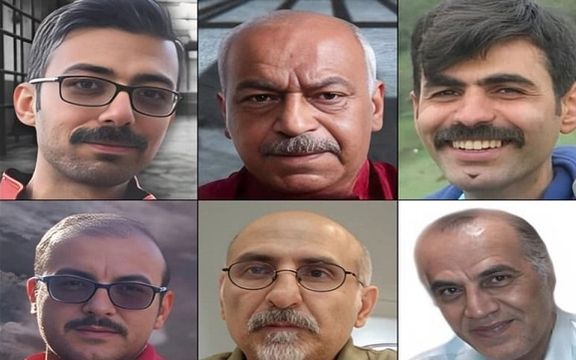
Amnesty International has launched an urgent action campaign to halt the execution of six Iranian men sentenced to death following what the rights organization described as a grossly unfair trial.
The men, including Abolhassan Montazer, 65, and Akbar Daneshvarkar, 58, were convicted in October 2024 by a court in Tehran on charges of "armed rebellion against the state," or baghi.
Amnesty said the trial was “marred by allegations of torture and other ill-treatment to extract forced confessions”, with defendants denied the right to legal representation from the time of their arrest.
“These six men were convicted and sentenced to death following a sham trial that flagrantly violated their fair trial rights,” Amnesty said.
“This case is a chilling reminder of how Revolutionary Courts operate under the influence of security and intelligence bodies, imposing death sentences after grossly unfair trials,” Amnesty added.
The organization urged Iranian authorities to quash the death sentences and convictions, grant the men a fair retrial and protect them from further torture.
Amnesty has also called on the international community to push for a moratorium on executions in Iran, where it has seen a sharp rise, with at least 853 executions carried out in 2023.
According to the US-based rights group HRANA, at least 54 political prisoners, including Azizi, are currently facing execution across various prisons in Iran. Iran has faced increasing international criticism for its widespread use of the death penalty, especially against political prisoners and activists.
The United Nations human rights office reported in January that Iran in 2024 executed 901 people, including 31 women, marking a sharp rise in capital punishment cases.
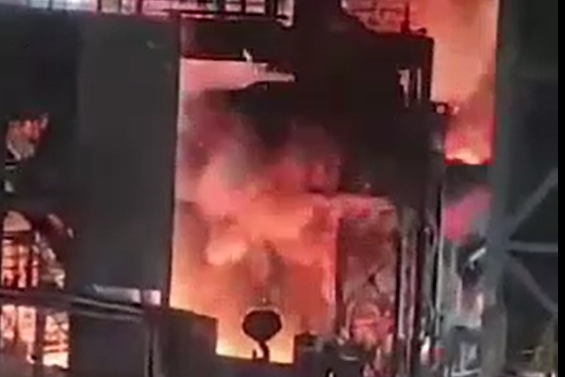
A video shared on Iranian social media shows the moment an explosion occurred at a furnace in the Arfa steel smelting facility in Ardakan, Iran.
The blast caused a fire, but no casualties were reported. The furnace operator only experienced the shockwave from the explosion.